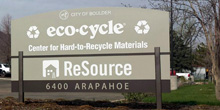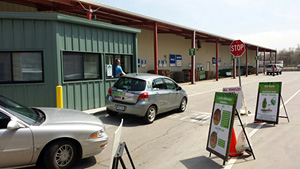Zero Waste Case Study: Boulder
 On this page:
On this page:Partnership
City of Boulder voters approved a "Trash Tax" that has supported innovative waste reduction and zero waste practices. The City and Boulder County have zero waste by 2025 goals. The city has adopted a Zero Waste Strategic Plan and a Universal Zero Waste Ordinance to expand recycling and composting to all Boulder residents, employees and visitors.
The city entered into an innovative zero waste partnership with Eco-Cycle Inc., one of the largest non-profit recycling organizations in the nation. Eco-Cycle created the first Materials Recycling Facility (MRF) in the Rockies in 1979.
Contractual Arrangements
- A guaranteed base service fee plus revenue sharing
- Shared environmental goals of lower residuals that cannot be recycled and fewer contaminants in the recyclable and compostable materials collected
- Incentives primarily related to facility/equipment maintenance issues
- Labor goals supporting good, safe working conditions.
 Center for Hard to Recycle Materials (CHaRM) drop off area in Boulder, CO. Under a contract with the City of Boulder, Eco-Cycle operates a Center for Hard to Recycle Materials (CHaRM) that handles over 2 million pounds of materials each year and hosts Hard-to-Recycle Roundups on specified dates to collect materials from remote communities for a wide range of materials, many for a fee, including:
Center for Hard to Recycle Materials (CHaRM) drop off area in Boulder, CO. Under a contract with the City of Boulder, Eco-Cycle operates a Center for Hard to Recycle Materials (CHaRM) that handles over 2 million pounds of materials each year and hosts Hard-to-Recycle Roundups on specified dates to collect materials from remote communities for a wide range of materials, many for a fee, including:- Electronics
- Small Appliances
- Difficult to recycle plastics:
- Plastic shopping and newspaper bags, plastic zip bags, dry cleaner bags and bubble wrap
- #6 white block foam packaging and rigid foam insulation
- #2 large plastics such as toys and plastic play structures, plastic lawn furniture, plastic watering cans, laundry baskets, clean plastic buckets (no residue), crates, rigid backyard kiddie pools and plastic trash containers
- Political yard signs (corrugated plastic)
- Books and manuals
- Cooking oils
- Bikes, bike parts, and bike tires
- Fire extinguishers
- Yoga mats
- Textiles
Advantages
- Sustainable Funding: The voter approved recycling tax has provided funding to support zero waste planning and infrastructure.
- Covers Hard-to-Recycle Materials: The program developed facilities, collection programs and markets for difficult-to-recycle materials that are usually discarded.
- Aligned Interests: The revenue-sharing contract provision supports the county and contractor's mutual interest in working toward high diversion.
- Payment Structure Provides Continuity: The guaranteed base service fee allows the contractor to focus on outreach and creating innovative zero waste programs. County staff and the contractor meet twice a month to address immediate issues, cost reviews and non-routine expenses.
- Cost Savings: The non-profit contractor is experienced in providing low cost programs with low profit margins.
Disadvantages/Omissions
- Experienced Non-Profit Zero Waste Partners: Many communities do not have experienced community zero waste partners.
- Innovation vs. Risk: Fundamental challenges relate to the fact that government is a “low risk taker” while successful zero waste innovation involves risk taking.
- Inflation Index: The contract is not indexed for inflation.
